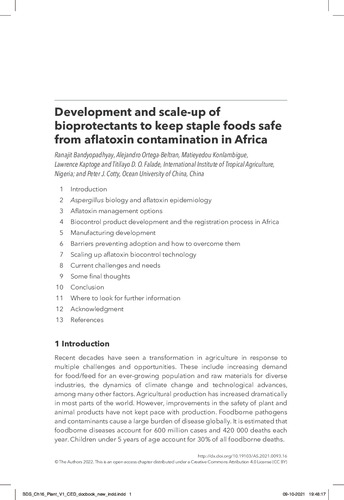Development and scale-up of bioprotectants to keep staple foods safe from aflatoxin contamination in Africa
Abstract
Aflatoxins pose a significant public health risk, decrease productivity and profitability and hamper trade. To minimize aflatoxin contamination a biocontrol technology based on atoxigenic strains of Aspergillus flavus that do not produce aflatoxin is used widely in the United States. The technology, with the generic name Aflasafe, has been improved and adapted for use in Africa. Aflasafe products have been developed or are currently being developed in 20 African countries. Aflatoxin biocontrol is being scaled up for use in several African countries through a mix of public, private, and public-private interventions. Farmers in several countries have commercially treated nearly 400,000 ha of maize and groundnut achieving >90% reduction in aflatoxin contamination. This chapter summarizes the biology of aflatoxin-producing fungi and various factors affecting their occurence, including climate change. Various management practices for aflatoxin mitigation are then discussed. These include biological control, which is increasingly being adopted by farmers in several countries. We discuss biocontrol product development and commercialization in various African countries. Subsequently, we highlight some barriers to adoption and other challenges.

